|
Director's Message
Dear Colleagues,
Last Wednesday Penny King received the ANU’s Clare Burton Award for her outstanding contribution to progressing equal opportunity and diversity in the University. Please join me, the School, the VC and the university in congratulating and thanking Penny for her efforts.
And please don’t forget to submit your ‘activities’ statement for the annual report to the Chair of Faculty by 5pm Friday.
Steve Eggins |
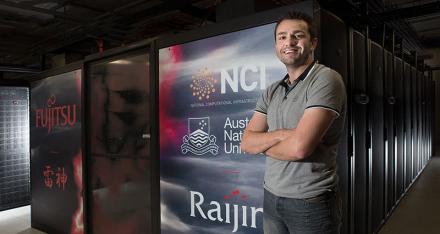
|
|
Congratulations:
Rhodri Davies won the prestigious Anton Hales Medal for 2018 last week from the Academy of Science.
>Read more
|
|
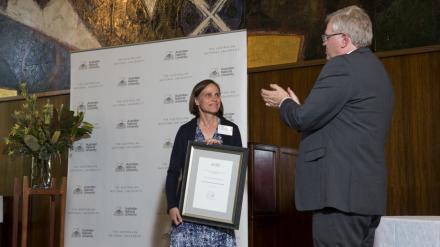
|
|
Clare Burton Award for excellent in Equity and Diversity
Congratulations to Associate Professor Penelope King
This award recognises University staff making significant contributions to promoting equity and diversity in the workplace.
Penny King is a very worthy recipient of the Clare Burton Award for Excellence in Equity and Diversity. As the founder and inaugural chair of the Research School of Earth Sciences (RSES) Equity and Diversity Committee and deputy chair of the CPMS committee she has tirelessly and passionately led a process of
real and positive change. Her impressive list ofachievements include:
>> Implementation of the first Workplace Culture Survey at RSES, supported by a grant from the Gender Institute.
>> Clarification and quantification of the situation around equity, diversity, inclusivity and workplace culture at RSES.
>> Development of evidence-based, prioritised recommendations for actions in the School, many of which have already been implemented by the senior leadership group and are leading to positive change.
>> This also became the model for similar activities in other ANU Schools and outside organisations.
>> Shown leadership at College level by influencing formation of the CPMS equity and diversity committee.
|
|
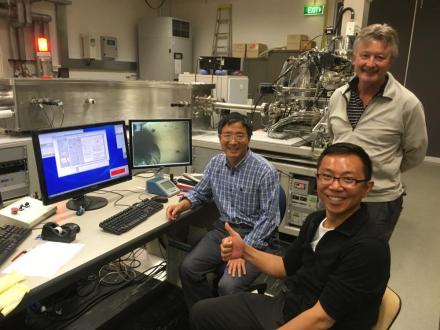
|
|
The Avogadro Project comes to RSES
How many atoms are there in a kilogram of silicon? Well it depends on the isotopic composition of the silicon. In the past couple of weeks we have been visited by members of the National Institute of Metrology, Beijing to determine the Si isotopic composition in a sphere of silicon that is being used to redetermine Avogadro’s number to higher precision. This in turn will be used to redefine the mass of the kilogram in terms of the lack constant. The silicon being used has been enriched in 28Si leaving only a trace of 29Si and 30Si. Our job is to measure the isotopic abundances to around 4% accuracy and precision. This stretches our measurement capabilities because the 30Si abundance is only around 3x10-7, some five orders of magnitude lower than normal silicon.
Photo:
Dr Tongxiang Ren, Institute of Metrology, Beijing (front), Dr Yanbin Wang, Beijing SHRIMP Center, and Dr Peter Holden, SHRIMP Manager analysing silicon metal on SHRIMP SI |
|
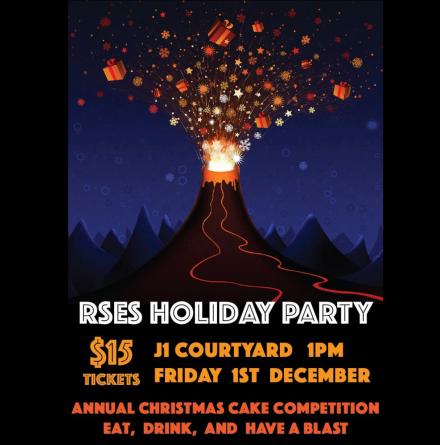
|
|
Save the date:
RSES Holiday Party
Friday 1st December |
|
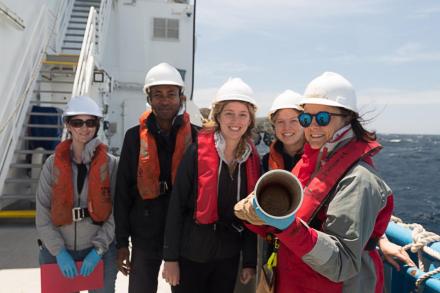
|
|
CAPSTAN at sea training for Hons and Masters students
The Collaborative Australian Postgraduate Sea Training Alliance Network (CAPSTAN) voyage set sail for Hobart from Henderson, W.A. on the 14th of November with 20 students from around Australia for two weeks of intensive at sea training on board the Marine National Facility, RV Investigator. Leanne was instrumental in initiating the three year pilot program and then out to sea and is participating as a trainer on board. ANU is looking at becoming a partner in the program so that our Honours and Masters students specialising in marine sciences can participate in the program in the future. For information on CAPSTAN, and to read the student blogs from the first voyage: or the CSIRO blog:
CAPSTAN also aims to train scientists less familiar with accessing research vessels through the trainer program, including an opportunity for ECRs to be the co-chief scientist on board. Trainers are selected from all fields of marine science (geophysics, geology, oceanography, biology, chemistry, atmospherics) and are given the opportunity to work with the Marine National Facility equipment and staff on board.
The two weeks are an intense and satisfying way to gain experience and establish a passion for marine science, whilst building capability and a multidisciplinary network across Australian marine science students. If you are interested let the School know!
Photo credit: Carlie Devine/MNF
Photo- A/Prof. Leanne Armand (right) working with CAPSTAN students on how to take gravity cores.
|
|

|
|
Outreach Opportunities:
Over December-January we will have a lot of visitors to RSES. Please consider contacting the person listed below to volunteer to either to host a group in your laboratory or to give a talk.
- Rossmoyne School, WA
Dates: 5 December, 11.30am - 12.30pm
Type of help needed: 1 hour chat and lab tour (a dozen students)
Contact:Michael Anenburg
- STEM Summer School for Indigenous Students
Dates: 11–15 December
Type of help needed: workshops, lab tours, lectures
Contact: Michelle Salmon
- NYSFNational Youth Science Forum
Dates: Tuesday, 9 January 2 - 5 pm, Tuesday, 23 January 2 - 5 pm
Type of help needed: Student Session A: 14 students plus 1-2 student staff
Student Session C: 14 students plus 1-2 student staff
Contact: Charles Le Losq
- NSTSSNational Science Teacher Summer School
Dates: Wednesday, 10 January, 10:30 am - 1:00 pm 20 teachers – request lab visits
Type of help needed: workshops, lectures, resources
Contact: Malcolm Sambridge
- Science Olympiad programEarth and Environmental Science Summer School (EESO) lectures and practical
Dates: Mon-Thurs: Jan 8-11 and 15-18
Type of help needed: 1 hr guest lecturers and/or laboratory visits on any topic in Earth Systems Science [solid earth, geophysics, geochem, fluids, environmental, etc] and Planetary Astronomy will be most welcome. The EESO students are very high ability Yr9-11 High School students who have been invited to attend Summer School, having topped an extremely challenging national selection exam. At Summer School they are put through the equivalent of a first year university course in EES but in some areas of the course the students are easily operating at levels much higher than most good first year students.
Any ANU/RSES staff and post-graduates who are in Canberra during January 2018 who would like to contribute can contact Greg to discuss how they might be able to help with a presentation that relates to their research work and/or how they might be able to show us some of the research laboratories in action.
Contact: Greg McNamara |
|
|
Conferences, Meetings and Workshops:
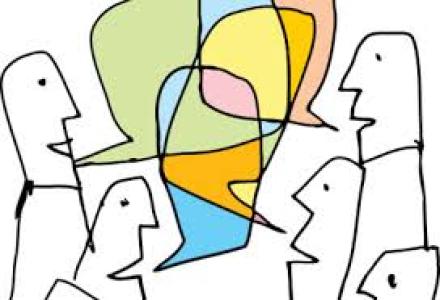
|
|
Franco-Australian Astrobiology and Exoplanet School and Workshop 16 - 20 December, 2017, Australian National University
The ANU (co-sponsors include ORIGINS Team- RSES) in collaboration with the Paris Sciences et Lettres (PSL) Research University will host the first Franco-Australian Astrobiology and Exoplanet School and Workshop. Exoplanets and astrobiology are rapidly emerging fields that combine astronomy, biology, and earth sciences. Key questions to answer are: Do protoplanetary disks include compositional trends that imprint on the future planets? What should future observations of Solar System bodies focus on? Where should we search for nearby habitable Earth-like planets? How can the science of the remote detection of biosignatures be advanced? What can our knowledge of life on Earth tell us about life elsewhere in the universe?
This workshop will bring leading experts from France, Australia and around the world to identify new avenues for answering these questions. The outcomes of this workshop will inform future collaborative projects between Australia and France.
The first 2 days (Dec 16 & 17) will be a school with lectures intended for PhD, Masters and undergraduate students. The following 3 days will be a workshop with research presentations on astrobiology and exoplanets. The outcomes of this workshop will inform future collaborative projects between Australia and France in these fields.
AMOS-ICSHMO 2018
The Australian Meteorological and Oceanographic Society and the American Meteorological Society, are holding the Joint 25th AMOS National Conference and 12th International Conference for Southern Hemisphere Meteorology and Oceanography, AMOS-ICSHMO 2018, at UNSW Sydney 5-9 February 2018 |
|
|
|
|
|

|
|
This Week's Seminars:
Data Surgery Event:
Hales room Monday 27th November 11.30-12.30pm
Topic: TBC
Speaker:
School Seminar:
Jaeger 1 Seminar Room - Tuesday 28th November 4.00 - 5.00pm
Topic:
Speaker:
OCG Seminar:
Jaeger 7, Hales Seminar room - TBC
Topic:
Speaker:
Jaeger 1 Seminar Room - Thursday 30th November 1-2pm
Topic: Building an experimental planet
Speaker: Dietmar Muller (University of Sydney)
Petrology and Geochemistry Seminar
Ringwood Room, 1st December J4 - 12.30- 1.30pm
|
|
|
New Publications:

|
|
Blong, R., Fallon, S., Wood, R., McKee, C., Chen, K., Magill, C., Barter, P. (2017)
Significance and timing of the mid-17th-century eruption of Long Island, Papua New Guinea,
Roberts, A. P., Almeida, T. P., Church, N. S., Harrison, R. J., Heslop, D., Li, Y., Li, J., Muxworthy, A. R., Williams, W. & Zhao, X. (2017).
Resolving the origin of pseudo-single domain magnetic behavior.
Kawakubo, Y., Alibert, C. & Yokoyama, Y. (2017). A reconstruction of subtropical western North Pacific SST variability back to 1578, based on a Porites coral Sr/Ca record from the northern Ryukyus, Japan.
Haynes, M., Horowitz, F., Sambridge, M., Gerner, E. and Beardsmore, G. (2018). Australian mean land-surface temperature. Geothermics, 72, 156-162.
|
|
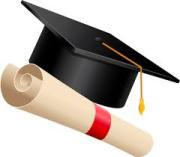
|
|
Award to Degree:
Congratulations
Rhys Hawkins on awarded degree. |
|
|
Follow us on Twitter:

|
|
|

|
|
ORCID
Research Services Division and the Library (with executive sponsorship from DVCRI Prof Margaret Harding) are encouraging all academics to obtain an ORCID identifier. Currently, 80% of all academics across the ANU have an ORCID and the process is really easy, this will become even easier when RIMS goes-live at the end of November.
If you already have an ORCID, you can now order business cards, conference posters and include it on your signature block.
If you have any questions, please contact rims.support@anu.edu.au
|
|
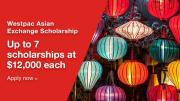
|
|
Westpac Asian Exchange Scholarships
Up to 7 scholarships at @ $12,000 each > Apply now |
|
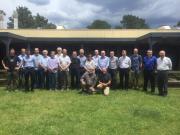
|
|
11th annual TANG3O meeting
The 11th annual TANG3O meeting was held at RSES on the 22nd-23rd November. The meeting organised by Dr Mark Kendrick of RSES attracted researchers from across Australia and involved overseas manufacturers. TANG3O is the national Thermochronology and Noble Gas Geochemistry and Geochronology Organisation (https://tang3o.org/) and the annual meeting provides a forum for researchers to present their latest results and coordinate national funding and science initiatives. |
|

|
|
If you're round the traps in Canberra on December 7th, 2017, please join us at the National Library of Australia for the launch of Exploring the Earth Under the Sea. Neville Exon has bought together tall tales and true in this wonderful history of Australia and New Zealand in the Integrated Ocean Drilling Program.
Please RSVP so we can be sure we have enough drinks and nibbles! |
|
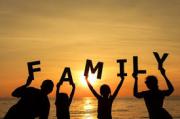
|
|
Supporting Breastfeeding at ANU launch
12:30-1:30pm, Monday 11 December
Common Room, University House
A working group has presented some key findings and recommendations to better support breastfeeding to the ANU Executive for consideration.
At this event we will;
- launch the report of recommendations
- hear from Professor Richard Baker, PVC (University Experience)
- launch a range of new resources, created in collaboration with the Australian Breastfeeding Association
- present on a visual audit of the ANU parenting spaces
A light lunch will be available. Please RSVP to Eventbrite for catering purposes |
|
|
|